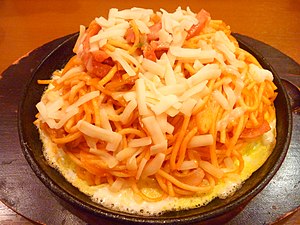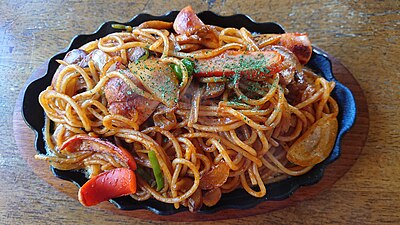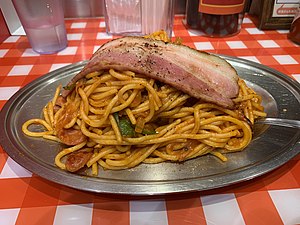Naporitan
- View a machine-translated version of the Japanese article.
- Machine translation, like DeepL or Google Translate, is a useful starting point for translations, but translators must revise errors as necessary and confirm that the translation is accurate, rather than simply copy-pasting machine-translated text into the English Wikipedia.
- Do not translate text that appears unreliable or low-quality. If possible, verify the text with references provided in the foreign-language article.
- You must provide copyright attribution in the edit summary accompanying your translation by providing an interlanguage link to the source of your translation. A model attribution edit summary is
Content in this edit is translated from the existing Japanese Wikipedia article at [[:ja:ナポリタン]]; see its history for attribution. - You may also add the template
{{Translated|ja|ナポリタン}}to the talk page. - For more guidance, see Wikipedia:Translation.
-
 Media: Naporitan
Media: Naporitan
Naporitan or Napolitan (Japanese: ナポリタン) is a popular Japanese itameshi pasta dish. The dish consists of soft-cooked spaghetti, tomato ketchup, onion, button mushrooms, green peppers, sausage, bacon and optionally Tabasco sauce. Naporitan is claimed to be from Yokohama.[1]
Origin

Naporitan was created by Shigetada Irie (入江茂忠), the chef of the Hotel New Grand in Yokohama, for general Douglas MacArthur. Because available ingredients were limited after World War II, he had to use what was on hand for the general, who lived at the hotel with his wife.[1]
Name
The chef named the dish after Naples, Italy (hence "Napoli"). Phonetically, the Japanese language does not distinguish R and L as separate sounds, and so uses the same katakana characters to represent R and L sounds of Western alphabets. Thus when converting katakana back into English, based solely on the Japanese spelling in the English alphabet is ambiguous and can vary. The spelling Naporitan is derived from the usual romanization of Japanese, while the spelling Napolitan takes the origin of the name into account. This could be roughly translated as Neapolitan.
Gallery
-
 With sausage and broccoli
With sausage and broccoli -
 With cheese
With cheese -
 With bell peppers
With bell peppers -
 With bacon
With bacon -

-

See also

- Naporitan
- Yōshoku
- Itameshi
- List of pasta dishes
- Neapolitan ragù
- Filipino spaghetti, a similar pasta dish from Philippines
References
- ^ a b スパゲッティナポリタンは横浜生まれ! (PDF) (in Japanese). Archived from the original (PDF) on 2011-05-23.
- "ナポリタン! Naporitan, I'm crazy for Naporitan spaghetti!", Fuso "smick" sha – November 2004, ISBN 978-4-594-04832-7 (Japanese)
- v
- t
- e
- Aglio e olio
- Älplermagronen
- Amatriciana
- American chop suey
- Arrabbiata
- Baked ziti
- Barbecue spaghetti
- Bolognese
- Bigoli in salsa
- Cacio e pepe
- Carbonara
- Chicken Picasso
- Chicken riggies
- Chili mac
- Ciceri e tria
- Cincinnati chili
- Fettuccine Alfredo
- Fideuà
- Filipino spaghetti
- Frogeye salad
- Giouvetsi
- Hamburger Helper
- Haitian spaghetti
- Johnny Marzetti
- Kugel
- Lagane e cicciari
- Lasagne
- Macaroni and cheese
- Macaroni pie
- Macaroni salad
- Macaroni schotel
- Macaroni soup
- Makarony po-flotski
- Naporitan
- Naryn
- Noodle kugel
- Passatelli in brodo
- Pasta al pomodoro
- Pasta alla gricia
- Pasta alla Norma
- Pasta con i peperoni cruschi
- Pasta con le sarde
- Pasta e fagioli
- Pasta primavera
- Pasta salad
- Pastitsio
- Pastitsada
- Penne alla vodka
- Pizza-ghetti
- Rigatoni con la pajata
- Sopas
- Spaghetti alla Nerano
- Spaghetti alla puttanesca
- Spaghetti alle vongole
- Spaghetti and meatballs
- Timballo
- Tumact me tulez
- Túrós csusza
 Food portal
Food portal

















